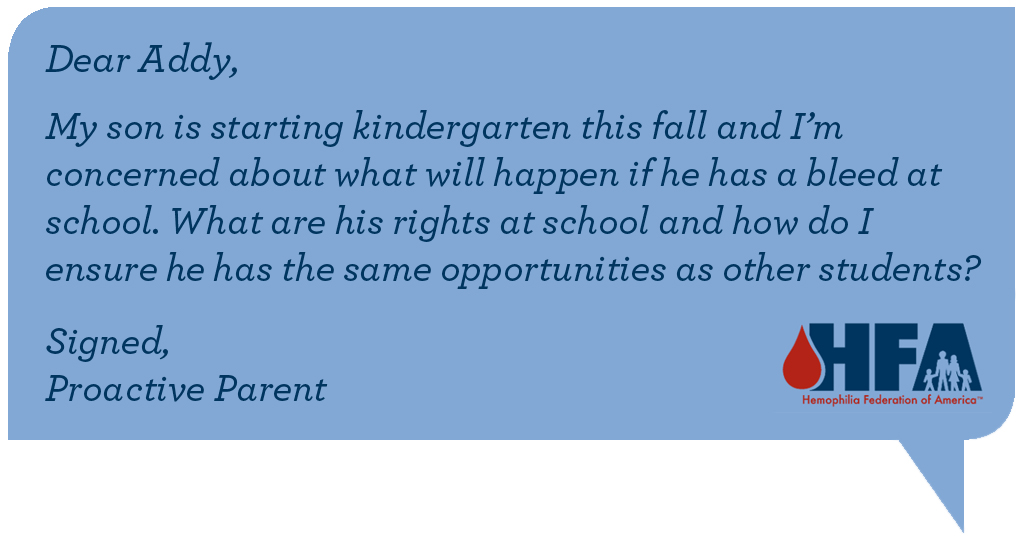 Dear Addy,
Dear Addy,
My son is starting kindergarten this fall and I’m concerned about what will happen if he has a bleed at school. What are his rights at school and how do I ensure he has the same opportunities as other students?
Sincerely,
Proactive Parent
______________________________________________________________________________________________________________________________________________________________________________________________________________
Dear Proactive,
With the new school year approaching, this is a great time to be in contact with your child’s school about a making a plan to manage his bleeding disorders. Use HFA’s Back to School Toolkit to educate the school nurse, administrators, and teachers about bleeding disorders and your son’s needs.
Here are resources to help you advocate for your child:
- Section 504 of the Rehabilitation Act of 1973 is a federal civil rights law to stop discrimination against people with disabilities, including a documented medical condition. One of its main protections is to assure that a child with a bleeding disorder will not be discriminated against in school and has the accommodations and modifications necessary to access any and all activities, lessons, events, etc. A 504 plan is a legally binding document, created with the parent, teacher, and an administrator.
- An Individualized Education Plan (IEP) is a document designed to accommodate and modify the curriculum and its delivery to meet your child’s learning needs. A child will not qualify for an IEP unless they have one of the disabilities covered under IDEA and they need special education to make progress. With hemophilia, a child can qualify for an IEP because of hemophilia, but not all children with a bleeding disorder will need a IEP. A student that would need special education services will need an IEP. An IEP is a legally binding document created with the parent, teacher, administrator, school psychologist, and special education teacher.
- With the school nurse, write an individual health plan (IHP) for your child. Distribute this “what to do, when” plan to your son’s teachers as well. For example: if your son hits his head: send him to the nurse immediately. The nurse will then have a separate plan with more details on what to do.
Before talking with your son’s school, prepare yourself with these tools and tips. Ask questions and keep detailed records of your conversations and the paperwork you are required to submit to the school. Just like when you were a student, preparation and follow through are key to a successful academic year!
Sincerely,
Addy
HFA frequently receives questions from the bleeding disorders community related to advocacy issues. The questions often impact the entire community. In an effort to reach the largest audience possible with our responses to these widely applicable questions, HFA developed “Dear Addy.” Questions submitted to this column are edited in order to protect privacy and should be considered educational only, not individual guidance.



